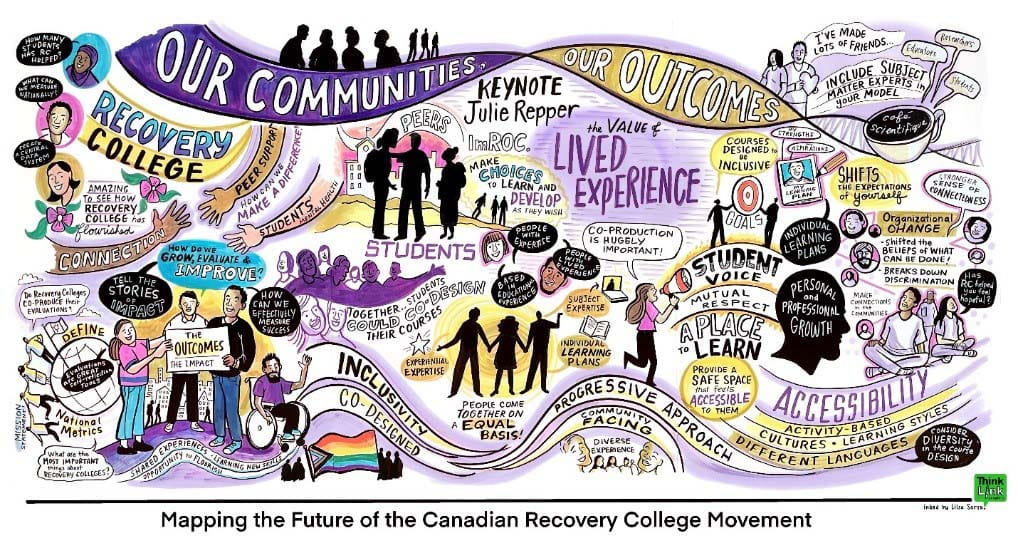Imagine a space where the pursuit of mental well-being transcends clinical boundaries. A space created for personal growth, skill-building, and community support. Welcome to the world of recovery colleges—vibrant education hubs where individuals chart their own paths to wellness.
Recovery colleges offer a unique approach to mental health support. They offer co-produced courses, peer support, and education aimed at fostering connection, hope, a positive sense of identity, meaning, and empowerment. “Recovery colleges reduce power imbalances by situating people with lived experience of mental health challenges and service providers as equal partners in the design and creation of mental health education and support,” explains Holly Harris, Research Coordinator, CAMH. They provide a space where people can reclaim their agency and identity, free from the constraints of traditional patient-care provider dynamics.
Canada is home to more than 30 recovery colleges, the second-highest number globally. “Recovery colleges are one of the fastest-growing movements in mental health,” Holly said. The first recovery college in Canada opened in 2014, “They really started to gain traction in 2016, with more than 50 partnership organizations helping them grow quickly over the last few years.”
CAMH’s own recovery college, the Collaborative Learning College (CLC), opened in 2019 and is, “guided by the values of equity, accessibility and personal autonomy,” explained Jordana Rovet, Coordinator, Collaborative Learning College. “Our purpose is to create a dynamic and inclusive community that supports individuals in meeting their self-identified learning and wellness goals.”
“At recovery colleges, you’re not viewed as a person in need of help. You get to choose your level of engagement, the courses you take, and make decisions at a stage in life where many decisions are made for you,” said Dr. Sophie Soklaridis, Senior Scientist and Research Chair of Recovery and Equity-Focused Mental Health Education Research, CAMH. “This recovery-oriented approach can be a complement to their clinical care as part of the stepped care model.”
Co-Development for Sustainability & Impact
Once the Collaborative Learning College was established, it opened the door for Holly, Sophie and the CLC research team to pursue recovery college research at CAMH. Despite the growth of recovery colleges across Canada, there was no standardized measurement of success or impact.
With funding from the Canadian Institutes of Health and Research (CIHR), they began a patient-oriented research project entitled Our Recovery, Our Outcomes: Co-Producing an Evaluation of Recovery Colleges. The project involved recovery college researchers, staff, students, and volunteers exploring whether recovery college evaluations were co-produced. Their findings? Co-production, despite being a central feature of recovery colleges, was not usually extended to program evaluations. “But if everything else in recovery colleges is co-produced, then why not the evaluations?” Sophie questioned.
The project findings were shared with the Canadian Recovery College Community of Practice (CoP), representing 150 members from over 50 organizations, prompting reflection on evaluation capacity across the country. “The national community collectively decided that co-producing national recovery college metrics would build capacity, create a cohesive national voice, and help us advocate for program growth and sustainability,” said Holly.


Liisa Sorsa from ThinkLink Graphics created a live graphic recording of the event and the rich conversations that took place. These images provided a visual grounding for discussions during the Café Scientifique event and will serve as a tool for reflection as the national community embarks on the implementation of the metrics.
What followed was another CIHR-funded event — Our Communities, Our Outcomes Café Scientifique — co-hosted by CAMH and the Canadian Mental Health Association (CMHA). This two-day event gathered over 120 stakeholders from across Canada in the Arrell Family Foundation Auditorium at CAMH to co-produce an implementation plan for the collection of evaluation metrics nationally. An unprecedented effort as no other country, to date, has established national metrics for recovery colleges.
“Our Communities, Our Outcomes was both the culmination of a seamless collaboration between CMHA, CAMH, and the CoP over the past year, and also the launch of so much more exciting work to come. Together with CAMH we are able to advance our recovery college work across Canada to demonstrate the impact of recovery colleges, and continuously improve our programs,” said Denise Silverstone, National Director, Programs and Services, CMHA.
The process was inclusive and transparent, involving workshops, consultations, and ongoing feedback to co-produce a national mission statement, objectives, and metrics that would be practical and meaningful to recovery college stakeholders. "This isn't just about numbers on a page," Holly emphasized. "It's about creating a culture where every voice matters, where successes are celebrated, and challenges are learned from together."
That culture is reflected in the metrics, which include hope and reach—evaluating how recovery colleges influence participants' sense of hope, and the number of unique attendees across the country.
With the event behind them and the summer to coordinate efforts, the team is on track to implement the newly developed national metrics across the country by September 2024. “We are very ambitious, but it’s been working out for us so far…so why not continue to dream big?” Sophie said.
Looking Ahead & Growing the Movement
Awareness of recovery colleges remains limited—a challenge Sophie and Holly are eager to address.
They believe that raising awareness is key to expanding access and ensuring that everyone can benefit from recovery colleges. As they navigate the next steps of this journey, Sophie, Holly, the CLC research team, and their community of practice remain dedicated to their mission.
"As we move forward, we're not just measuring success," Sophie concluded. "We're defining it together and this project demonstrates the power of collaboration to create meaningful change in people's lives."
With hope as their guiding light, they are paving the way for a future where recovery colleges play a central role in mental health support across Canada.
To learn more about the Collaborative Learning College at CAMH, visit clc.camh.ca.

